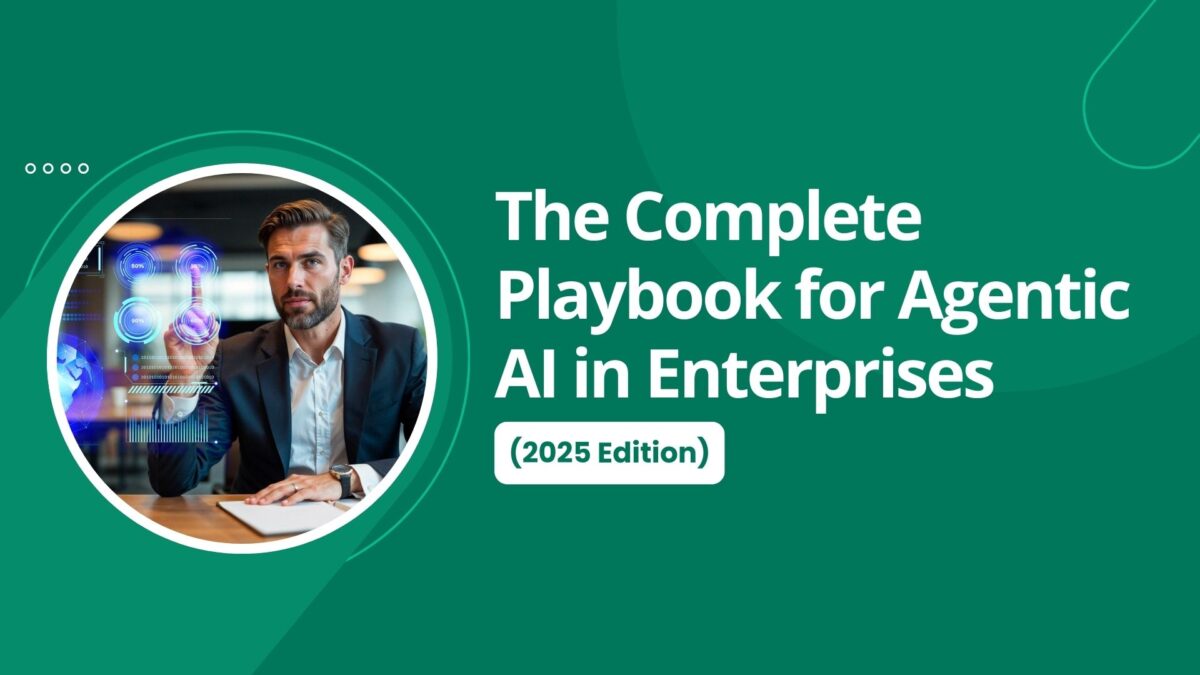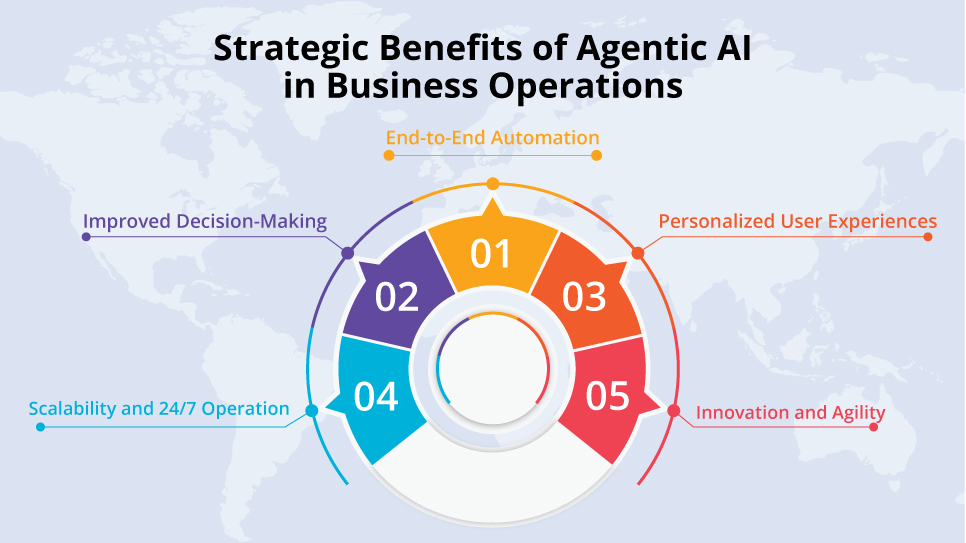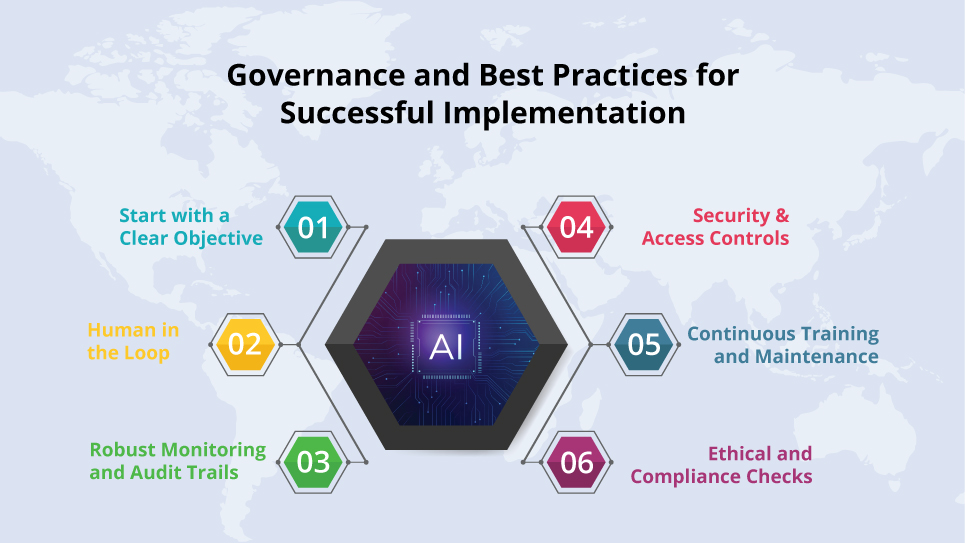The Complete Playbook for Agentic AI in Enterprises (2025 Edition)

Agentic AI in enterprises is more than a buzzword in 2025; it’s a strategic game-changer. Unlike traditional AI that merely analyzes data or answers questions, agentic AI systems act autonomously within business environments. These autonomous AI systems for enterprises can set goals, make decisions, and execute tasks with minimal human input. The result? Companies can transform operations, from IT and finance to customer service, with AI “agents” working as digital team members. In fact, adoption is surging, nearly 80% of organizations are already deploying AI agents, and 96% plan to expand their use by 2025. This Enterprise AI Agents Playbook will guide you through understanding, adopting, and thriving with agentic AI in your organization.
Understanding Agentic AI in Enterprises vs. Traditional AI
To appreciate the adoption of agentic AI in enterprise settings, it’s essential to understand how agentic AI differs from earlier AI approaches. Traditional AI is powerful for narrow, pre-defined tasks but remains largely reactive. It answers queries or automates a single step when prompted, and it doesn’t initiate complex actions on its own. By contrast, agentic AI in enterprises is proactive and goal-driven. These agents maintain memory, learn from past interactions, and integrate with tools via APIs to take multi-step actions autonomously.
Key traits of agentic AI systems:
- Autonomy: They don’t wait for step-by-step instructions. An agent can spot an issue (e.g., a scheduling conflict) and proactively resolve it by coordinating with relevant systems and people.
- Continuous Learning: They retain context and improve over time. Each interaction updates the agent’s knowledge, leading to smarter responses and better strategies in the future.
- Tool Integration: They use APIs and connectors to enterprise software (CRM, ERP, databases, etc.), allowing them to not just think, but do, whether that’s sending emails, retrieving data, or executing transactions.
By understanding these differences, it becomes clear why agentic AI adoption in enterprise environments is accelerating. Businesses are no longer satisfied with static chatbots or one-off machine learning models. They are looking for autonomous AI systems for enterprises that behave like versatile teammates, adapting to dynamic conditions.
Why 2025 Is the Year for Agentic AI in Enterprises
Several converging factors in 2025 make now the ideal time to embrace agentic AI in enterprises:
- Mature AI Models: Advanced LLMs (e.g., GPT-4, Claude 3) provide the “brains” of modern agents, enabling comprehension and reasoning in human language.
- API-First Ecosystem: Businesses run on a plethora of SaaS tools and internal systems, nearly all offering APIs. This “API economy” means agents can plug into everything from Salesforce and SAP to Slack, giving them the “arms and legs” to act across platforms.
- Cloud Infrastructure: Ubiquitous cloud computing makes it feasible to deploy and scale AI agents enterprise-wide. With elastic cloud resources, an army of AI agents can work 24/7, handling spikes in workload without missing a beat.
- Open-Source Tools: A wave of open-source agent frameworks and libraries has lowered the barrier to implementing agentic AI.
Bottom line: All the ingredients for successful agentic AI deployments, smart models, integration capabilities, scalable infrastructure, and development tools are readily available in 2025. Forward-thinking companies recognize this perfect storm. They are moving beyond simple automation towards autonomous AI systems for enterprises that can dynamically learn and act. Those who get in early stand to gain a significant competitive edge in efficiency and innovation.
Strategic Benefits of Agentic AI in Business Operations

Adopting agentic AI in enterprises isn’t just a tech upgrade, it drives tangible business value. Here’s how autonomous agents are elevating operations and outcomes:
- End-to-End Automation: By chaining multiple steps together, agentic workflows handle processes start-to-finish without hand-offs. This dramatically cuts manual effort and cycle times.
- Improved Decision-Making: Agents constantly convert raw data into insights and actions. They don’t just generate reports; they execute on them.
- Personalized User Experiences: Autonomous AI systems for enterprises can greatly enhance customer and employee experiences. Instead of one-size-fits-all responses, agents tailor their actions.
- Scalability and 24/7 Operation: Agents don’t eat, sleep, or take vacations. Enterprises can scale tasks up or down seamlessly by deploying more agent instances in the cloud.
- Innovation and Agility: By automating routine work, agentic AI frees human teams to focus on creative, high-value projects. Additionally, agents themselves can be used to prototype ideas rapidly.
These benefits explain why companies are pouring resources into agentic AI. In a recent industry survey, 43% of enterprises said they’re allocating over half of their AI budgets to agentic AI, and 62% expect ROI above 100% from these investments. Clearly, businesses anticipate that autonomous agents will pay for themselves many times over through efficiency gains and new revenue opportunities.
Enterprise AI Agents Playbook: Key Steps for Adoption
Implementing agentic AI might sound daunting, but with the right approach, it can be done methodically. Think of this as a how to implement agentic AI in organizations guide, a step-by-step playbook to introduce autonomous agents into your enterprise workflow:
- Identify High-Impact Use Cases: Start by pinpointing where agentic AI adoption in enterprise will bring the most value. Look for processes that are repetitive, data-intensive, and cross-functional.
- Ensure Data and Tool Readiness: Agentic AI thrives on data and connectivity. Audit the data sources, databases, and APIs available for your chosen use cases. For an agent to be effective, it needs access to relevant enterprise systems (CRM, ERP, HR systems, etc.) through secure API connections.
- Choose the Right Frameworks and Models: Select an AI agent architecture that fits your needs. This could involve large language models for reasoning and dialogue, plus an agent framework to manage the agent’s planning and tool use.
- Prototype and Pilot: Build a minimum viable agent. Start with a limited scope pilot where the agent handles a simple task end-to-end under supervision.
- Integration and Deployment: Once the pilot is successful, integrate the agent into production systems. Containerize or use serverless functions to deploy it on your cloud platform for scalability.
- Train, Tune, and Expand: Post-deployment, continuous improvement is key. Agentic AI in enterprises should be trained with new data regularly and fine-tuned as it learns.
Throughout these steps, don’t forget the human element. Change management and staff training are important so that your team knows how to work with AI agents.
Use Cases of Agentic AI in Business
Let’s explore some prominent use cases of agentic AI in business to illustrate what these agents can do across different enterprise functions:
- Intelligent Customer Service: Agentic AI agents are revolutionizing support desks. They go beyond FAQ chatbots by actually resolving issues.
- Sales and CRM Automation: In sales operations, agents act as tireless assistants. Consider lead nurturing: an autonomous AI system for enterprises can scan websites and social media for potential leads, send personalized outreach emails, update the CRM with lead responses, and even schedule meetings.
- Financial Process Automation: Banks and fintech firms are embracing agentic AI in enterprises to handle complex financial workflows.
- IT and Operations Agents: Within internal IT departments, agentic AI is used for tasks like incident response and DevOps.
- Research and Analytics: Agents can function as diligent research analysts, too. It can summarize trends and even suggest strategic actions.
These examples scratch the surface; the versatility of agentic AI in enterprises means nearly any area with data and repeatable processes is ripe for an AI agent. From HR recruiting to compliance monitoring, companies across industries are piloting agents that deliver notable ROI and performance improvements.
Governance and Best Practices for Successful Implementation

As you adopt agentic AI, it’s critical to establish governance and follow best practices. Autonomous agents bring immense power, and with great power comes great responsibility. Here are some guidelines to ensure your agentic AI adoption in enterprise is successful and sustainable:
- Start with a Clear Objective: Don’t deploy an agent for the sake of AI hype. Have a well-defined goal or KPI. This keeps the project focused and lets you measure success.
- Human in the Loop: Especially early on, keep humans in the loop for oversight. You might allow the agent to make recommendations, but require human approval for final actions in critical areas.
- Robust Monitoring and Audit Trails: Treat AI agents like employees who need supervision. Implement logging for the agent’s decisions and actions.
- Security & Access Controls: Because autonomous AI systems for enterprises often have access to sensitive data and systems, enforce the principle of least privilege.
- Continuous Training and Maintenance: An agent is not a “set and forget” software. Allocate resources for its ongoing training and maintenance. Business conditions change, your agent should too.
- Ethical and Compliance Checks: Ensure your agent’s behavior aligns with company ethics and industry regulations. Put filters to avoid biased or inappropriate outputs.
Following these best practices will help your organization reap the rewards of agentic AI in enterprises while minimizing risks. Companies that pair autonomy with strong governance are seeing impressive results. In one study, enterprises with multiple AI agents deployed were far more likely to hit their AI project goals than those without proper oversight. In short, success with agentic AI comes from balancing innovation with control.
Conclusion
The era of agentic AI in enterprises is here. By starting small, empowering people with agents, and scaling step by step, businesses can unlock new productivity, innovation, and customer experiences. Having a clear enterprise AI agents playbook ensures you stay ahead of the curve as competitors adopt autonomous systems.
In 2025, agentic AI isn’t optional; it’s a marker of leading enterprises. Those who adopt now will gain agility, efficiency, and long-term advantage.
Ready to implement agentic AI in your organization?
Partner with FX31 Labs. We bring expertise in custom enterprise software development, nearshore application development, and generative AI consulting to help you build and scale with confidence.
FAQ’s
Q1. What is agentic AI in enterprises?
Agentic AI in enterprises is are autonomous systems that act like a virtual employee. They use AI models and tool integrations to make decisions, execute tasks, and manage processes with independence and adaptability.
Q2. How does agentic AI adoption in enterprise environments benefit a company?
Agentic AI boosts efficiency, reduces errors, and improves decision-making by automating workflows 24/7. It scales without extra headcount and enhances customer and employee experiences, driving ROI across enterprise functions.
Q3. What are some use cases of agentic AI in business today?
Agentic AI is used for finance (loan processing, fraud detection), sales (lead nurturing, CRM updates), customer service (resolving tickets end-to-end), IT support, HR automation, and supply chain optimization across industries.
Q4. How do we implement agentic AI in organizations safely and effectively?
Start with clear goals and suitable use cases. Ensure data and API access, select the right models, and begin with pilot projects. Add governance, monitoring, and human oversight to scale agentic AI safely and effectively.
Q5. What is an enterprise AI agents playbook?
An enterprise AI agents playbook is a roadmap for AI adoption. It covers identifying use cases, pilot-to-deployment steps, governance, KPIs, and compliance measures, ensuring safe and effective agent integration into operations.
